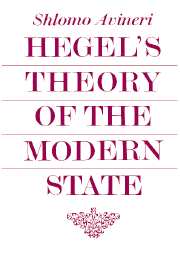Book contents
- Frontmatter
- Contents
- Title in the Series
- Preface
- 1 Beginnings
- 2 Positivity and Freedom
- 3 The Modernization of Germany
- 4 The New Era
- 5 Modern Life and Social Reality
- 6 The Owl of Minerva and the Critical Mind
- 7 The Political Economy of Modern Society
- 8 Social Classes, Representation and Pluralism
- 9 The State – the Consciousness of Freedom
- 10 War
- 11 The English Reform Bill – the Social Problem Again
- 12 History – the Progress towards the Consciousness of Freedom
- Epilogue
- Bibliography
- Index
4 - The New Era
Published online by Cambridge University Press: 05 June 2012
- Frontmatter
- Contents
- Title in the Series
- Preface
- 1 Beginnings
- 2 Positivity and Freedom
- 3 The Modernization of Germany
- 4 The New Era
- 5 Modern Life and Social Reality
- 6 The Owl of Minerva and the Critical Mind
- 7 The Political Economy of Modern Society
- 8 Social Classes, Representation and Pluralism
- 9 The State – the Consciousness of Freedom
- 10 War
- 11 The English Reform Bill – the Social Problem Again
- 12 History – the Progress towards the Consciousness of Freedom
- Epilogue
- Bibliography
- Index
Summary
FROM JENA TO WATERLOO
Hegel moved to Jena in 1801 and stayed there as a Privatdozent at the University until 1807. It was during these years that Germany became ever more engulfed in the political consequences of the French Revolution; this was the period in which the Holy Roman Empire was finally dissolved and Prussian military might suffered the humiliating defeat at the Battle of Jena.
The political events at the turn of the eighteenth century had somehow dimmed the lustre of Jena as the capital of the German Enlightenment; but the tiny duchy of Saxe-Weimar, with Goethe as the ducal chief minister, still stood for all that was best in the tradition of German intellectual life. In the 1790s the University of Jena was famous for the scope of its academic freedom. Fichte's lectures there symbolized the intellectual reception of the French Revolution in Germany; its theological faculty was imbued with critical rationalism; and it was there that the empirical sciences were first introduced into German academic life. Inspired by Goethe, Duke Carl August did not join in the repressive measures introduced by other German potentates after the outbreak of the French Revolution, and Jena thus remained relatively free from the restrictions which were imposed upon the other German universities at the time of the wars against France.
It was in this atmosphere that, together with Schelling, Hegel edited in Jena the Kritisches Journal der Philosophic. It was a fighting journal, which sought to combat accepted opinions and to use critical faculties against obscurantism and traditionalism.
- Type
- Chapter
- Information
- Hegel's Theory of the Modern State , pp. 62 - 80Publisher: Cambridge University PressPrint publication year: 1972

